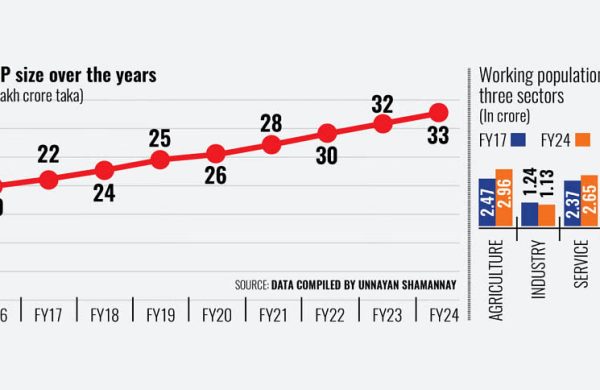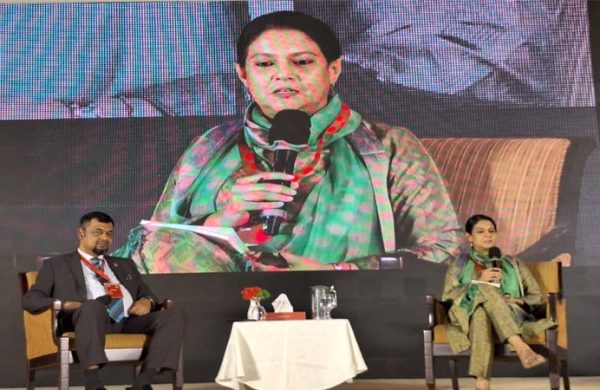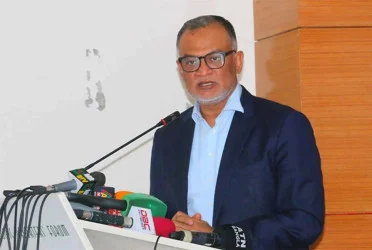Economy expanded, but jobs still in crisis
- Update Time : Wednesday, July 23, 2025

Staff Correspondent:
Over the past eight years until fiscal year 2023-24, the country’s economy grew by more than 50 percent, painting a rosy picture of performance by major sectors, while the expansion did not translate into job creation.
Employment grew by only 11 percent during the period, making a clear case of “jobless growth”, a term that economists have been using in recent years to refer to the paradox of growing gross domestic product (GDP) without much job creation.
“Our growth failed to meet the demand for jobs,” said Abdullah Nadvi, research director at non-governmental research organisation Unnayan Shamannay, during a discussion on employment challenges.
He said that although the country’s economic performance has been lauded globally, it has not translated into the expected rise in job opportunities.
In his presentation at the event, held at the organisation’s office, Nadvi pointed out that while GDP had grown fivefold, employment had increased by barely a fifth of that.
“For this reason, Bangladesh’s economic growth is referred to as ‘jobless growth’,” he said.
Nadvi also talked about the widely held belief that foreign direct investment (FDI) leads to huge job creation, calling it overly optimistic.
He said that between 2009-10 and 2020-21, the country received around $51 billion in FDI, which generated only about 5.46 lakh jobs.
In contrast, domestic investment during the same period stood at $106 billion and created more than 28 lakh jobs, he noted.
“This shows that FDI alone cannot solve the country’s employment challenges. Instead, greater emphasis must be placed on domestic investment,” he added.
From 2017 to 2022, the number of agricultural workers rose by 30 percent, while agri production increased by just 10 percent. According to Nadvi, this mismatch means the labour force is growing faster than production, which in turn is depressing incomes.
He also raised concerns over employment in the industrial sector, calling the situation alarming.
While industry’s share of GDP increased from 33 percent to 38 percent over the past eight years, the number of people employed in the sector has dropped by an average of 1 percent annually, said Nadvi.
The main reason is believed to be automation, he said, which means fewer workers are needed to maintain factory production. “As a result, despite growth in the industrial sector, employment is decreasing,” he said.
In the service sector, jobs are increasing by just 1 percent a year, whereas GDP is rising at 6 percent. Nadvi added that 68 percent of service sector workers are employed informally.
At the programme, researcher Maha Mirza said that relying solely on market forces to generate jobs in industry is a flawed approach.
“If the responsibility of job creation in the industrial sector is entirely left to the so-called free market economy, profits may increase, but employment generation in line with demand will not occur,” she said, adding that this has been evident over five decades of industrialisation in Bangladesh.
Muhammad Shahadat Hossain Siddiquee, economics professor at the University of Dhaka, argued that the country’s employment crisis could have been avoided if public resources had not been lost to defaulted loans and widespread corruption.
Suzana Karim, associate professor at the Institute of Health Economics, University of Dhaka, said Bangladesh is now paying the price for relying too heavily on a single sector to drive industrial growth.
She emphasised drawing lessons from international models to ensure both industrial expansion and adequate job creation.
AKM Fahim Mashroor, chief executive of Bdjobs, pointed out that a significant share of young people are graduating without the skills required in today’s job market. As a result, the unemployment rate is considerably higher among graduates than among those with only primary, secondary, or higher secondary education.
SM Zulfiqar Ali, research director at the Bangladesh Institute of Development Studies (BIDS), said that unless education standards align with labour market needs, it will not be possible to meet the challenges posed by automation, digitisation, and the Fourth Industrial Revolution.


















